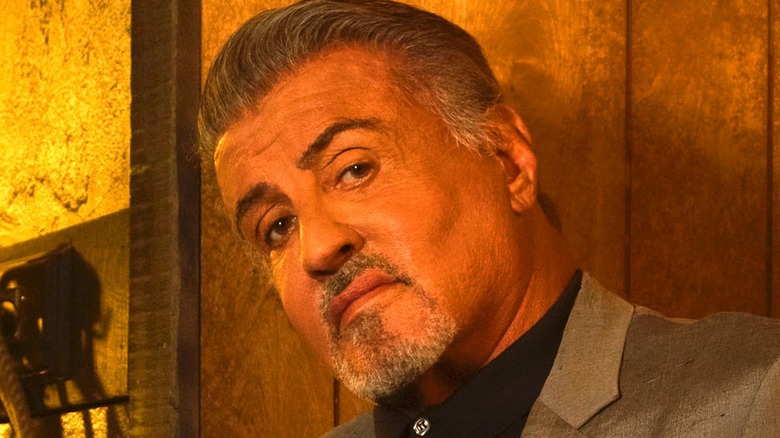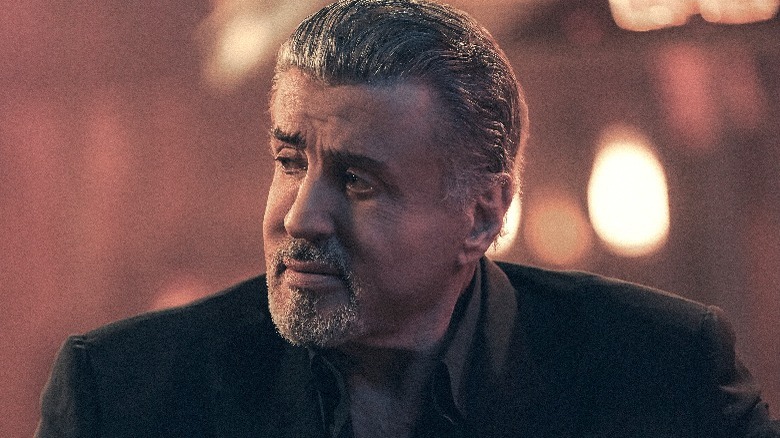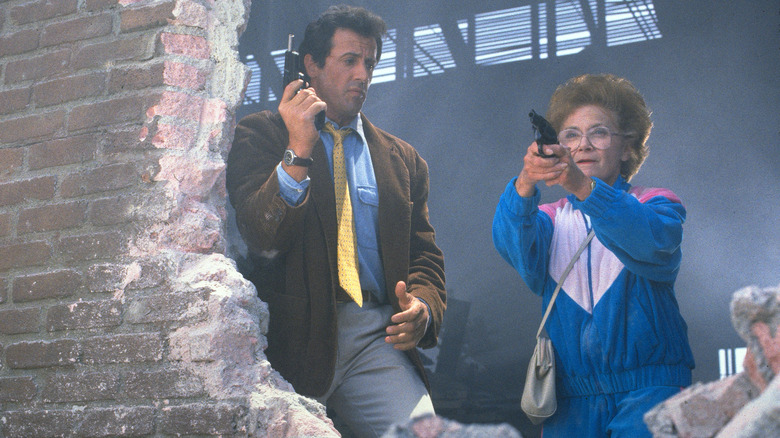Sylvester Stallone Never Thought He'd Get The Chance To Properly Show Off His Lighter Side Until Tulsa King
There is a select group of actors who classify as bona fide, headlining action heroes — Sylvester Stallone has been near the top of the heap for something approximating six decades. In the '70s, ”80s, '90s and beyond, films like "Cliffhanger," "Cobra," "Demolition Man" and the "Rambo" series made him a popcorn icon; even when folks tried to count the Italian Stallion out following duds like "Rhinestone," Daylight" or "Judge Dredd," he has risen again like Rocky Balboa from the mat. Think he's lost any of his mojo? Witness his sexagenarian successes with "The Expendables," as a fourth film releases later this year.
In past attempts at comedy ("Oscar," "Stop! Or My Mom Will Shoot," 2003's "Spy Kids: Game Over"), Stallone seemed in over his head, and poor box-office reflected audience disappointment. But now, this modern Hollywood legend is thrilled to be getting another opportunity with the Paramount+ series "Tulsa King,” which gives Stallone a darker, meatier sort of offbeat humor with which to play around.
A genre-bending project with a proudly twisted sensibility, "Tulsa" reviews have praised creator Taylor Sheridan's tightrope-walking between humor and crime fiction; a big part of the formula is Stallone, since it is imperative on him to properly ring-lead the circus, inserting humor and myth-building at appropriate moments around his powerful, no-nonsense character Dwight Manfredi. Now Stallone, who has always claimed to have a sense of humor and has shown it when possible, is calling Manfredi the closest he's ever come to his true self.
Tulsa King allows Stallone to show off his real personality
"Tulsa King" sees Manfredi (Stallone) released after 25 years in prison — but a return to his previous crime family comes with strings attached, and he is soon sent to Tulsa, Oklahoma. A city thus far untapped by the group comes with challenges he could never imagine; establishing himself as an organized crime kingpin provides a sense of levity in what would otherwise typically be a solidly dramatic project. One such source of humor comes from Manfredi's tech illiteracy in a world filled with plugged in people staring at their phones.
"Dwight acts the way I act around my house with my wife and my daughters," Stallone recently said in an interview, insisting that he enjoys playing up the offbeat conflicts in life. "I used to have to tell people that Rambo is a performance. I'm not really that monosyllabic, dark and petulant. I really don't talk like Rocky either. People always assumed that's who I am."
"This one, finally, is liberating because it is who I am," he added. "Dwight talks how I talk. This is how I roll."
Being so open comes with doubts for Stallone, as he has admitted fearing that his true personality might not measure up. But this hasn't been the case; the series bested even HBO's highly-touted "House of the Dragon" in ratings and has resulted in record-setting sign-ups for Paramount+.
"I thought, let me just see if this works," he remembers of his discussions with Sheridan early on in development. "If it bombs, then I know I have a sh***y personality. If it works, great, because I've been a class clown my whole life, believe me. That's why as a kid I went to 13 schools in 12 years. I'm very, very hyperactive and I thought I'd put it in this character to see if it flies."
Stallone first attempted comedy over 30 years ago
Oddly enough, Stallone's first mainstream film was a comedy, even if he didn't have much funny to do — he played an unnamed, unspeaking subway thug in Woody Allen's "Bananas." About twenty years later, as he and Arnold Schwarzenegger ruled the action game and the latter began branching out with hit comedies like "Kindergarten Cop" and "Twins," Stallone was eager to keep up with the competition — and Schwarzenegger decided to play a cruel prank.
The result was "Stop! Or My Mom Will Shoot," an ostensible "comedy" so bad that Roger Ebert once wrote: "It is moronic beyond comprehension, an exercise in desperation," and the Arizona Star said "You just have to sit back and wonder what Stallone was thinking." Released in back-to-back years with the equally-head-scratching gangster comedy "Oscar," Stallone's career as a funnyman was over before it began.
New York Times critic Janet Maslin was among many who weren't fans of "Oscar," noting Stallone's ineptitude while admiring his bravery. "It works a lot better than might have been expected," she wrote. "Mr. Stallone may not be a comic genius, but he's definitely a sport."
Years later, both films are faintly remembered (if at all) as cinematic punchlines. Including by Stallone, who has always been willing to poke fun at his failures, once claiming that "in some countries — China, I believe — running ['Stop! Or My Mom Will Shoot'] once a week on government television has lowered the birth rate to zero. If they ran it twice a week, I believe in 20 years China would be extinct."
All these years later, it seems, Stallone has finally found a funnybone that audiences can get behind. "It is the most liberating feeling," he says. "Because I never thought it was ever going to happen."


